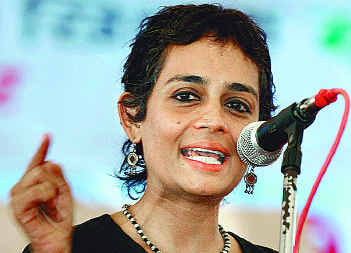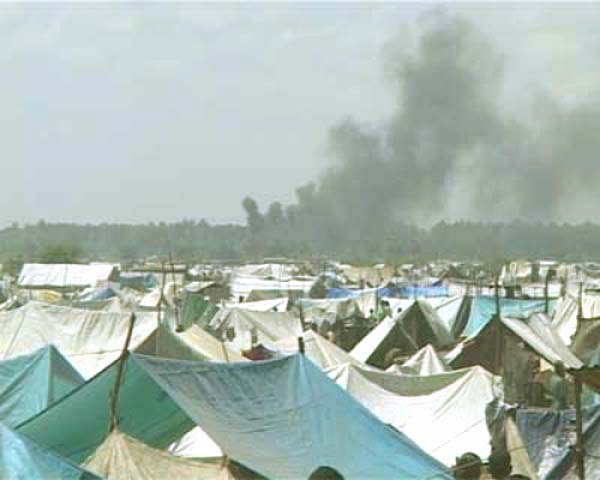|
The silent horror of the war in Sri Lanka
Arundhati Roy
Times of India, 30 March 2009
 "While the killing continues, while tens of
thousands of people are being barricaded into concentration
camps, while more than 200,000 face starvation, and a genocide
waits to happen, there is dead silence from this great country
[India]. It�s a colossal humanitarian tragedy. The world must
step in. Now. Before it�s too late." [Full
Text] "While the killing continues, while tens of
thousands of people are being barricaded into concentration
camps, while more than 200,000 face starvation, and a genocide
waits to happen, there is dead silence from this great country
[India]. It�s a colossal humanitarian tragedy. The world must
step in. Now. Before it�s too late." [Full
Text]
Comment by
tamilnation.org
Arundhati Roy's comments will be welcomed by not only Tamils
but all those concerned to secure freedom and justice for
the people of Tamil Eelam. Said that, the 'dead silence' of
India and the tardiness of the response by the 'world' is not because they are
all deaf.
Arundhati Roy said it in her in
conversation with Amit Sengupta in November 2005 -
"..The facts are there in the world today.
.. But what does information
mean? What are facts? There is so much information that almost
all becomes meaningless and disempowering....To
expose things is quite different from being able to effectively
resist things..."
Velupillai Pirabakaran said
it many years ago in 1993 -
"We are fully aware that the world is not rotating on the axis of
human justice. Every country in this world advances its own interests. It is the economic
and trade interests that determine the order of the present world, not the moral law of
justice nor the rights of people. International relations and
diplomacy between countries are determined by such interests. Therefore we cannot
expect an immediate recognition of the moral legitimacy of our cause by the international
community."
Maha Veera Naal Address - November 1993
And we said it two months ago -
"...the international community
will wait till Tamil resistance is sufficiently weakened or
annihilated before it attempts to intervene 'on
humanitarian grounds' and in seeming response to 'world wide Tamil appeals'.
Meanwhile the IC will even welcome such world wide appeals by Tamils
as that will pave the way (and establish useful contact points
amongst the Tamil diaspora) for IC's eventual intervention with
'development aid' with the mantra of not conflict resolution but
'conflict transformation'. Give them cake when they ask for freedom
from alien Sinhala rule. A conquered people should be grateful for
whatever they can get - though there may not be not
enough cake to go round. The Tamil people are being
taught the truth of something which
Subhas Chandra Bose
said many years ago - Freedom is not given, it is taken... "
Sinhala Sri Lanka's
Genocide of Eelam Tamils - a Crime Against Humanity,
29 January 2009
We said it again one month ago -
" It was the Buddha who said
that suffering is a great teacher. The Tamil people are being taught on
the hard anvil of death and suffering appropriately enough in Buddhist Sri Lanka that human rights and humanitarian laws
are more often than not, political instruments - instruments which
States use
selectively so that they may intervene to advance their own perceived strategic interests. 'Humanitarian
intervention' to prevent the humanitarian tragedy that is
taking place in the Tamil homeland, had it been early,
would have been kind. But the belated attempts that are
being made today expose not the humanitarian concerns of the
international actors but the strategic interests that impel
the international actors to act the way they do.
After all the simplest thing that the
international actors could have done to protect the Tamil people
would have been to remove the ban on the LTTE so that the capacity of the people
of Tamil Eelam to resist the
genocidal onslaught launched on them by Sinhala Sri Lanka may have
been strengthened. The simple and humane thing that the
international actors could have done was
not to taunt the struggles against terrorism with the label terrorism
but to adopt a
principle centered approach which liberated political language
and also helped to liberate
a
people who have
taken up arms as
a last resort in their
struggle for freedom from oppressive alien
Sinhala rule.
.."
The Politics of Humanitarian
Intervention, 24 February 2009
And, it seems that the 'world'
has not yet begun to rotate on the axis of human justice. The people of Tamil Eelam and
millions of Tamils living in many lands are being
taught by
the murderous Rajapaksa regime that
political power flows from the barrel of the gun.

Here, we are reminded again
of something which Arundhati Roy
said to Shoma Chaudhury in March 2007 -
".. to equate a
resistance movement fighting against enormous injustice
with the government which enforces that injustice is
absurd. The government has slammed the door in the face
of every attempt at non-violent resistance. When people
take to arms, there is going to be all kinds of violence
� revolutionary, lumpen and outright criminal. The
government is responsible for the monstrous situations
it creates...does this mean that people whose dignity is
being assaulted should give up the fight because they
can�t find saints to lead them into battle?. "
We agree with Arundhati Roy
that 'to expose things is quite different from being able to
effectively resist things.'
 The silent horror of the war in Sri Lanka The silent horror of the war in Sri Lanka
The horror that is unfolding in Sri Lanka becomes possible because
of the silence that surrounds it. There is almost no reporting in
the mainstream Indian media � or indeed in the international press �
about what is happening there. Why this should be so is a matter of
serious concern.
From the little information that is filtering through it looks as
though the Sri Lankan government is using the propaganda of the �war
on terror� as a fig leaf to dismantle any semblance of democracy in
the country, and commit unspeakable crimes against the Tamil people.
Working on the principle that every Tamil is a terrorist unless he
or she can prove otherwise, civilian areas, hospitals and shelters
are being bombed and turned into a war zone. Reliable estimates put
the number of civilians trapped at over 200,000. The Sri Lankan Army
is advancing, armed with tanks and aircraft.
Meanwhile, there are official reports that several ��welfare
villages�� have been established to house displaced Tamils in
Vavuniya and Mannar districts. According to a report in The Daily
Telegraph (Feb 14, 2009), these villages ��will be compulsory
holding centres for all civilians fleeing the fighting��. Is this a
euphemism for concentration camps? The former foreign minister of
Sri Lanka, Mangala Samaraveera, told The Daily Telegraph: ��A few
months ago the government started registering all Tamils in Colombo
on the grounds that they could be a security threat, but this could
be exploited for other purposes like the Nazis in the 1930s. They�re
basically going to label the whole civilian Tamil population as
potential terrorists.��
Given its stated objective of ��wiping out�� the LTTE, this
malevolent collapse of civilians and ��terrorists�� does seem to
signal that the government of Sri Lanka is on the verge of
committing what could end up being genocide. According to a UN
estimate several thousand people have already been killed. Thousands
more are critically wounded. The few eyewitness reports that have
come out are descriptions of a nightmare from hell. What we are
witnessing, or should we say, what is happening in Sri Lanka and is
being so effectively hidden from public scrutiny, is a brazen,
openly racist war. The impunity with which the Sri Lankan government
is being able to commit these crimes actually unveils the deeply
ingrained racist prejudice, which is precisely what led to the
marginalization and alienation of the Tamils of Sri Lanka in the
first place. That racism has a long history, of social
ostracisation, economic blockades, pogroms and torture. The brutal
nature of the decades-long civil war, which started as a peaceful,
non-violent protest, has its roots in this.
Why the silence? In another interview Mangala Samaraveera says, ��A
free media is virtually non-existent in Sri Lanka today.��
Samaraveera goes on to talk about death squads and �white van
abductions�, which have made society ��freeze with fear��. Voices of
dissent, including those of several journalists, have been abducted
and assassinated. The International Federation of Journalists
accuses the government of Sri Lanka of using a combination of
anti-terrorism laws, disappearances and assassinations to silence
journalists.
There are disturbing but unconfirmed reports that the Indian
government is lending material and logistical support to the Sri
Lankan government in these crimes against humanity. If this is true,
it is outrageous. What of the governments of other countries?
Pakistan? China? What are they doing to help, or harm the situation?
In Tamil Nadu the war in Sri Lanka has fuelled passions that have
led to more than 10 people immolating themselves. The public anger
and anguish, much of it genuine, some of it obviously cynical
political manipulation, has become an election issue.
It is extraordinary that this concern has not travelled to the rest
of India. Why is there silence here? There are no �white van
abductions� � at least not on this issue. Given the scale of what is
happening in Sri Lanka, the silence is inexcusable. More so because
of the Indian government�s long history of irresponsible dabbling in
the conflict, first taking one side and then the other. Several of
us including myself, who should have spoken out much earlier, have
not done so, simply because of a lack of information about the war.
So while the killing continues, while tens of thousands of people
are being barricaded into concentration camps, while more than
200,000 face starvation, and a genocide waits to happen, there is
dead silence from this great country. It�s a colossal humanitarian
tragedy. The world must step in. Now. Before it�s too late.
|